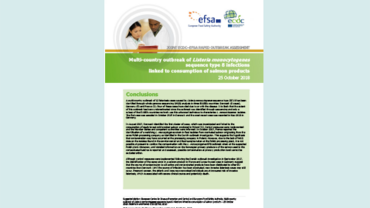Rapid Risk Assessment: Human cases of Q fever and ‘fresh cell therapy’ in Germany, 16 October 2015
Following reports of Q fever cases associated with a so-called ‘fresh cell therapy’ performed in Germany, ECDC has prepared a rapid risk assessment. These cases reconfirm the risk of infectious disease transmission through xenotransplantation and countries may consider regulating such practices by establishing the national systems for vigilance and traceability of xenotransplantation.
Executive Summary
A new rapid risk assessment has been published on the risk of Q fever associated with ‘fresh cell therapy’ following seven such cases being reported after the procedure was performed in Germany.
Six human cases of Q fever were associated with so-called ‘fresh cell therapy’ performed in Germany in May 2014. An additional case was reported by the Paul Ehrlich Institute in Germany linked to the same practice in October 2014. These cases reconfirm the risk of infectious disease transmission through xenotransplantation. As the majority of Q fever cases are mild and self-limiting, similar events may remain undetected.
The potential recipients of fresh cell therapy or other products of animal origin, should be informed of the risks. Organisations that are active in donation and transplantation of substances of human origin should be aware that instances of fresh cell therapy occur, because potential donors who have received animal cells as part of such therapy should be rejected for donation. A number of European countries are in the process of regulating the practice and others may consider also doing so by, for example, establishing national systems for monitoring and traceability of xenotransplantation.
Fresh cell therapy
Fresh cell therapy, despite unproven efficacy and numerous associated risks, continues to be offered and used. Fresh cells are usually isolated from the homogenised organs and tissues of sheep foetuses and placentas. The live cells or extracts are injected into the recipient in order to obtain a purported revitalising effect. Often, these therapies are promoted as anti-aging treatments, treatment for chronic diseases, age-related disorders (such as arteriosclerosis) or as an alternative treatment for cancer.
Q fever
Q fever is an infectious disease caused by bacteria called Coxiella burnetii that affects both humans and animals. Q fever can be a mild illness but symptoms include sudden headaches, fever, chills, muscle soreness and, in some cases, pneumonia. Some symptoms such as fatigue can be long-lasting.
Complications
In a very small number of cases (around 1%), Q fever leads to a more serious illness known as chronic Q fever, sometimes after a number of years. The most common symptom of chronic Q fever is inflammation of the inner lining of the heart (endocarditis), which can be deadly if not treated.






